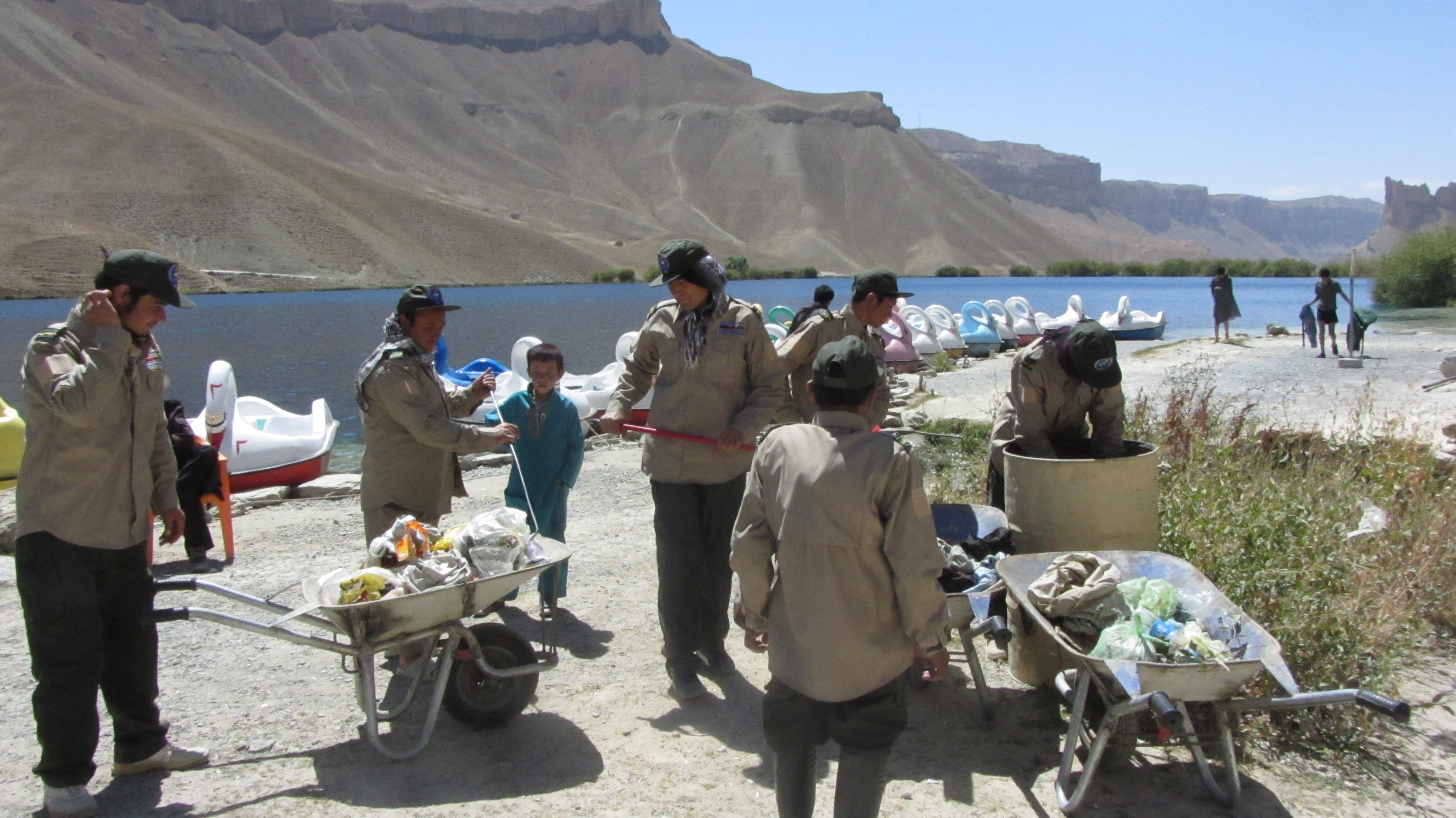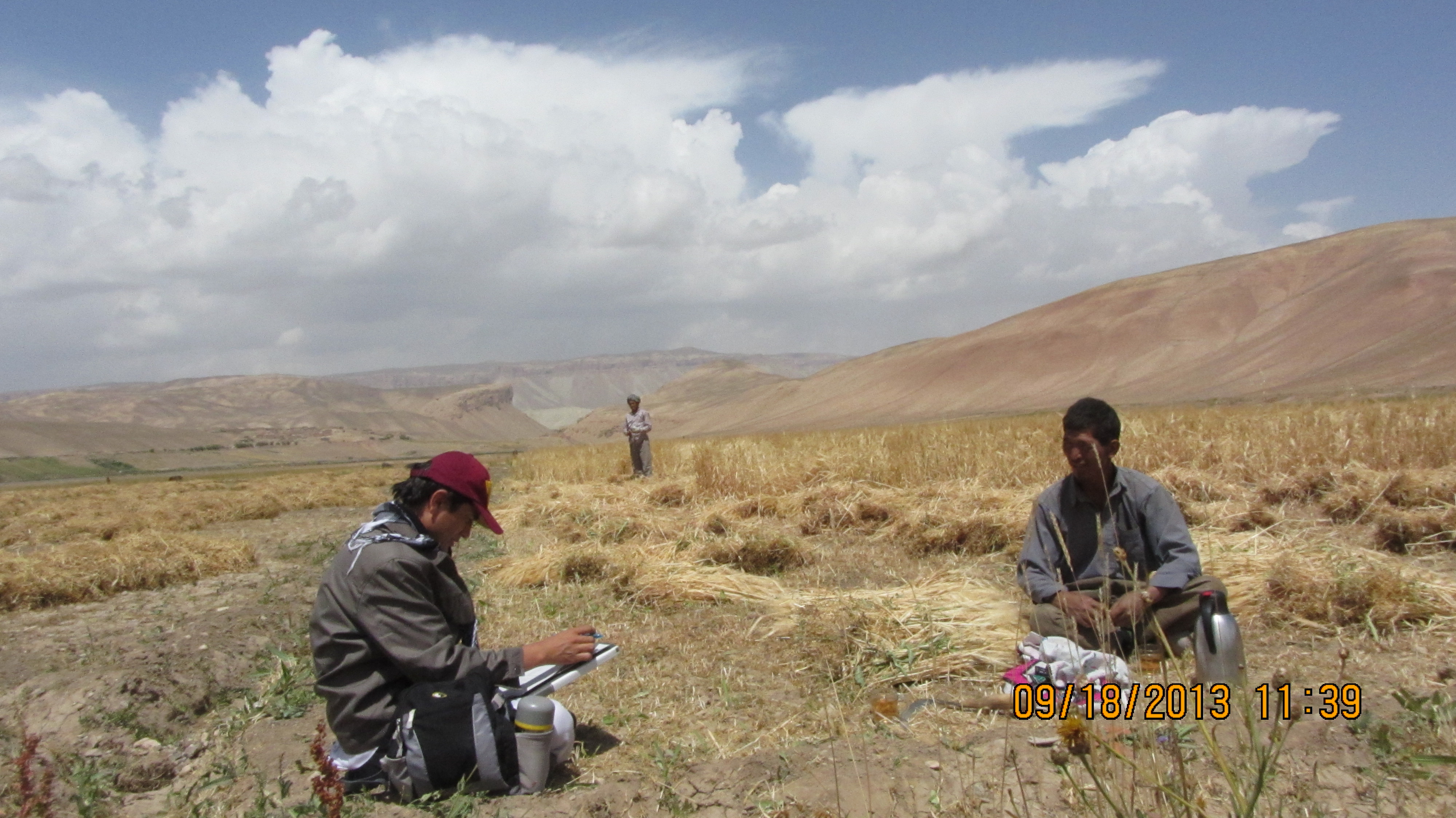Report
Environmental education and capacity building
POYA Ghulam Hussain ![]()
Environment Conservation
Graduate School of Agriculture
Host Organization: Wildlife Conservation Society
Location: Band-e-Amir National Park, Bamiyan, Afghanistan
Duration: 2013-August 9th – September 12th
Key words: Wildlife Conservation Society, environmental issues, environmental education, capacity building, alternative livelihood source
1. Wildlife Conservation Society (WCS)
Wildlife Conservation Society is an American NGO founded in 1895, with the mission to save the wildlife around the world. WCS has started its mission in Band-e-Amir National Park, Bamiyan, Afghanistan in 2006 focusing on biodiversity conservation, rangeland improvement, supporting the local governance institution through capacity building and improving sustainable livelihood of the local community.
The ongoing activities toward the objectives are summarized below.
1. Technical capacity development through environmental education program for the schools around the park, community conservation education outreach and expanding partner’s capacity.
2. Facilitate community livelihood development by securing sustainable sources of direct benefits to local communities (Community Livelihood Development-CLD). This objective contains the activities like community ranger program (camera installation, training and capacity building, salary for new employed rangers), ecotourism (English language training for rangers, shop owners and tourism guider, planting in amenity zone and installing signage in the park area) , and fuel efficient stove project(distribution of stoves and lanterns to the local community)
3. Create and strengthen community institution through providing training for the members of Band-e-Amir Protected Area Committee (BAPAC), a collaborative management board and Band-e-Amir Community Association (BACA), developing a management plan with park warden and other related agencies.
4. Strengthening laws, policy and institution through studying and then drafting resource use rules and regulations.
2. My activity during the internship
My activities during the internship are basically divided into two types.
A. Office based activities
B. Field based activities
Office based activities: in office based activities I attended in a series of meetings like weekly meeting and monthly meeting along the NGOs’ staff. In the meetings, I learned how to make weekly and monthly planning and reporting in an organization. Participating in workshops is another office based activity. The workshops are provided for the school teachers and newly employed rangers of the park, and I participated actively with the school teachers in environmental education training in teacher’s workshop. We listened to the trainer lectures and presentations regarding the current environmental issues in Band-e-Amir National Park and highlighting roles of environmental education to reduce these issues. In the workshop for the newly employed rangers we gained information regarding the responsibility of a ranger in a national park.
Field-based activities: in field based activities I joined WCS team in environmental education monitoring activities of the two schools within the park area. The team has established four types of committee in the frame of environmental education program. The committees are listed below:
a) Fuel committee
b) Livestock committee
c) Events registration committee
d) Environment committee
These committees included teachers as a supervisor and students from grade 6th to 12th as members. Students in these committees collected data and information filling in a certain format, from their respective villages, then submit them to their supervisors. The supervisors submit them to the WCS for analysis and reporting on a monthly basis. I with the staff from WCS went to monitor the activities of the mentioned committees in two schools in Sharistan and Kopruk villages within the national park.
Initiating and participating in cleaning campaign is another field based activity in this internship. After ending of the workshop for the newly employed cleaners of the park in the park office, we toke the cleaning stuff from park office and collected garbage (plastic bottles, other plastics, cans, and clothes…) from the lakeshores where the visitors boating point and the main shrine of the park are located. We asked visitors to join us in a demonstration encouraging volunteer activities.
Generating data to know the local people perception and attitudes regarding the national park and its management was another type of field based activity. I interviewed 80 households from six villages within the park to know their knowledge and perception regarding the protected area and its management. I found that the land tenure, alternative livelihood source, uneven distribution of tourism revenue is the main issues impacting the sustainable management of the Band-e-Amir National Park.
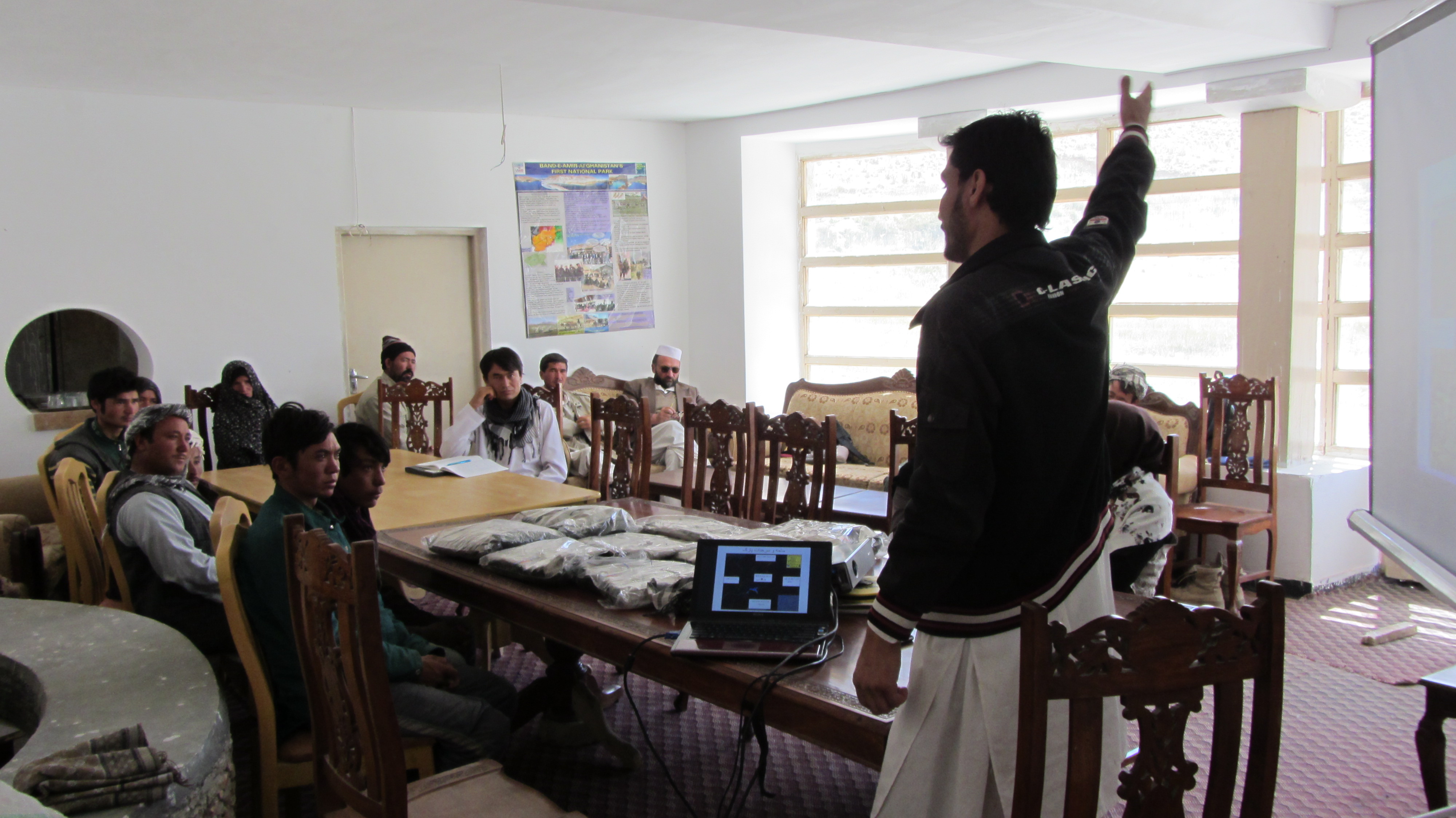 |
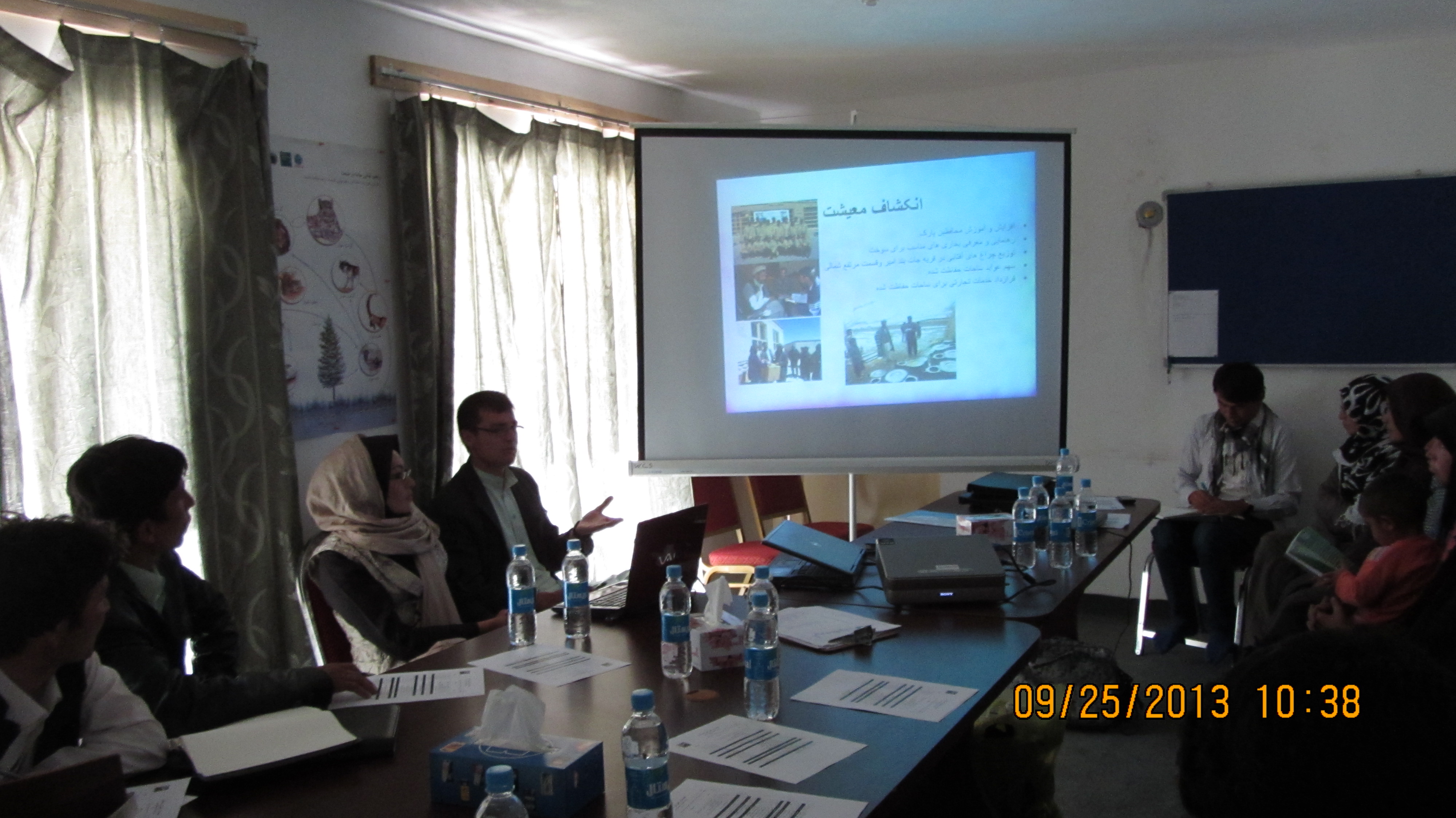 |
|
Workshop for the newly employed cleaner of the Band-e-Amir National Park
|
Workshop for the school teachers, WCS office Band-e-Amir National Park |
|
|
|
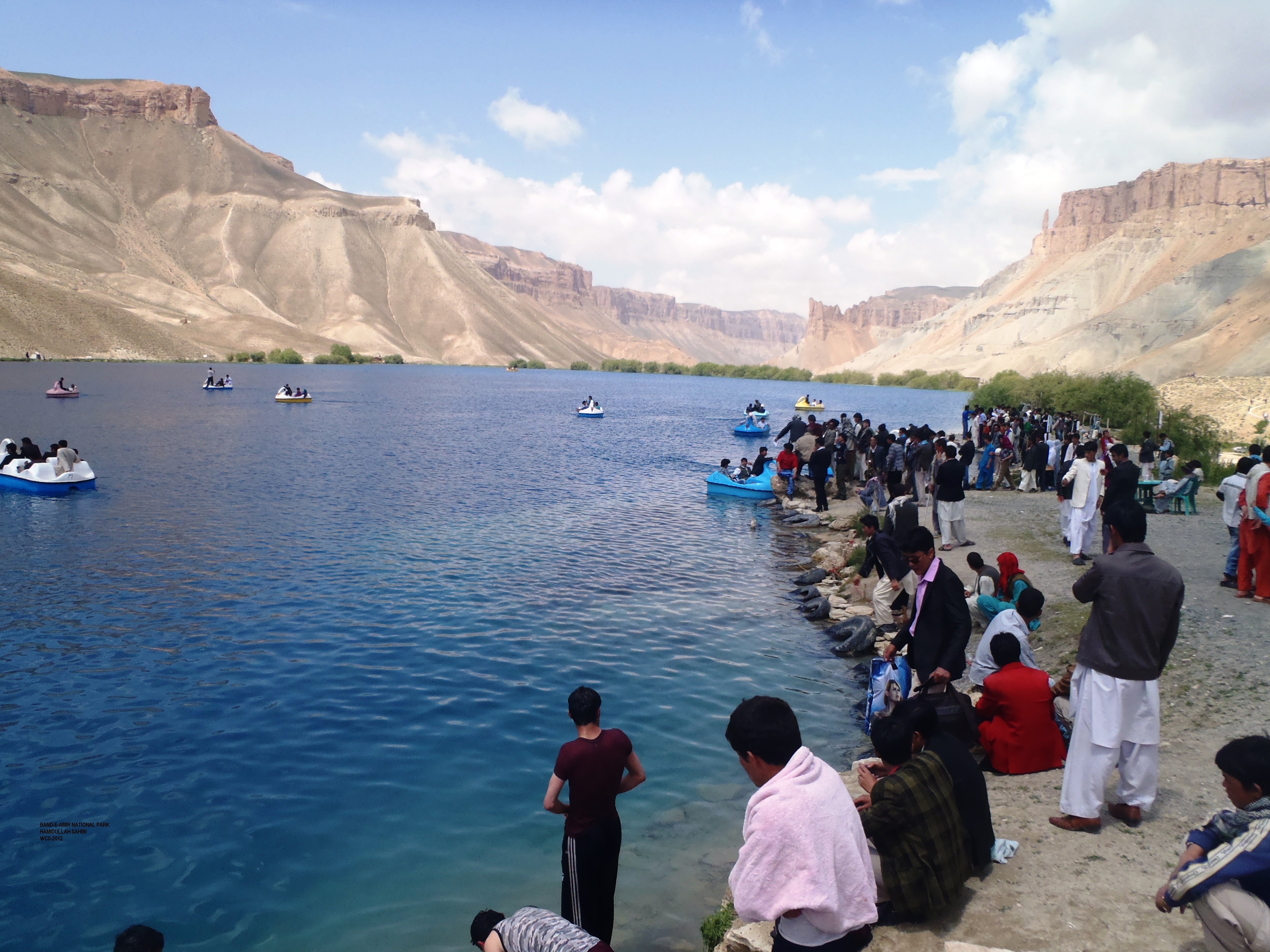 |
A cleaning campaign activity around lakeshore, Band-e-Amir National Park
|
Interviewing people in the field, Band-e-Amir National Park
|
Risk of water pollution because of garbage by visitors near the lakeshores in Band-e-Amir National Park |
3.Background of the WCS activities toward environmental issues in Band-e-Amir National Park
Decreasing the dependency on the natural resources for the source of livelihood
People are highly dependent on the natural resources as a source of livelihood in Band-e-Amir National Park. They engage in livestock and dry land farming which is called “ Lalmi” in the local language, overgrazing and bush collecting as forage and for heating, and also uprooting of the bushes to transport them out of the national park for sale in a local district bazaar as fuel to make money, hunting of birds and improper fishing methods. Consequently, biodiversity loss, flooding and soil erosion became a critical environmental issue within the national park. WCS was started its activity addressing biodiversity conservation and supporting sustainable livelihood sources. Improving alternative livelihood source through implementing some projects, distribution of stoves and lanterns to the households within the park to decrease bush collection and uprooting as fuel and training for the local initiatives for developing tourism are the examples of activities aiming at sustainable livelihood improvement and biodiversity conservation.
Environmental Education:
Environmental education is another program that WCS started to enhance the awareness and knowledge of local people as well as to elevate the understanding of new generation about the context of their surroundings and the importance of biodiversity conservation through teaching formally at their respective schools within the Band-e-Amir National Park. I was in a three-day workshop with the school teachers and asked them whether the impact of environmental education is being tangible or not. Most of them said yes however, they believed environmental education impacts, might not be tangible in a short time in Band-e-Amir National Park.. Related to the topic, I personally asked some ordinary people during my interview regarding the importance of vegetation cover, wildlife and so on. They answered that they are happy, because vegetation cover was improved, flooding decreased, and they can see a lot of fishes in lakes since they stopped improper fishing, there are a lot of birds and wild animals since hunting is banned, and these sources are valuable and they did not know the importance of environment components before the outreach environmental education by WCS.
Governance and institution development:
Another important objective for WCS was on the improvement of governance. WCS with other related actors like Department of Agriculture Irrigation and Livestock, Afghanistan Environmental Protection Agency (NEPA), technically and economically supported the establishment and strengthening of the collaborative institution like Band-e-Amir Protected Area Committee (BAPAC), park office, and Band-e-Amir Community Association (BACA). To be mentioned that the government related agency was the only actor dealing with park management in the past so the local people opinion had not been taken into account at all. The collaborative approach of the Band-e-Amir National Park was started in 2007 and all stakeholder groups including the local community were involved in decision making and enforcement. Currently the collaborative board (BAPAC) is struggling with various issues such as capacity building and so on however, the establishment of this committee ( BAPAC) has improved the management condition of the Band-e-Amir National Park in general. Addressing the issues in BAPAC committee, WCS works closely with all members in BAPAC to enhance their capacity in terms of management decision and enforcement. WCS believes that if there is good governance in place then environmental issues will be decreased accordingly. WCS provides workshops, training and exposure visits for the park staff, rangers, community representatives and community association to build their capacity in environmental management and conservation. I met a representative from local community who along with his colleagues visited a national park in Thailand. He said that the trip was organized by WCS and it was really effective to learn about local resident’s roles in park management.
But the problem of alternative efficient livelihood still exists, and it is directly impacting the well status of Band-e-Amir ecosystem. People still rely on bush collection for heating and livestock feeding as well as dry land farming which are disturbing the natural function of the ecosystem. The tourism is getting increased producing a lot of garbage without care of its harmful environmental impact. The visitors seem to have low knowledge of garbage management and come from remote areas. Moreover there is not a good system of garbage collection and treatment within the park and it creates a high risk of water pollution in travertine lakes in near future.
4. My own idea and future vision
I think the occurrence of environmental issues depend on various factors in the context of different countries. Such factors include not only industry and economy development but also poverty, war and institution deficiency and high dependency on the natural resource for the livelihood. I think it is a challenging task for the policy makers and managers in environmental management, to conserve vulnerable ecosystem while providing the basic necessities of its inhabitant in the context of high dependency on the ecosystem resources and services. I think in the context of Afghanistan for improving the protected area management we need to improve the protected area productivity through various possible industries like tourism and so on for such a purpose we need to support the local initiatives and enterprises. Supporting local initiative needs skills, knowledge and experiences. During this internship, I spent most of the time in the field communicating with different entities such as local community, government organization and NGOs so I have mad quit a good network and I think making a network is really important for an environmental leader to share the environmental issues and seek a comprehensive solution. I think at this internship, I have gained some of the experiences and skills such as social skill, field experiences and so on. And all what I gain in this internship will stand me to act as a good environmental leader in the future.
In the future I would like to continue researching, focusing on the roles of environmental education, as a factor decreasing environmental issues as well as the roles of tourism industry development as a potential source of alternative livelihood for the local community in a protected area. What I learned during one month internship with WCS is highly supportive approaching my goals in the future.
I would like to thank WCS’s staff dedicating their times and energy supporting me completing this internship. I would like to thank FOLENS for providing such opportunity, to get valuable skills and knowledge during my internship with Wildlife Conservation Society as an intern in Band-e-Amir National Park in Afghanistan.
